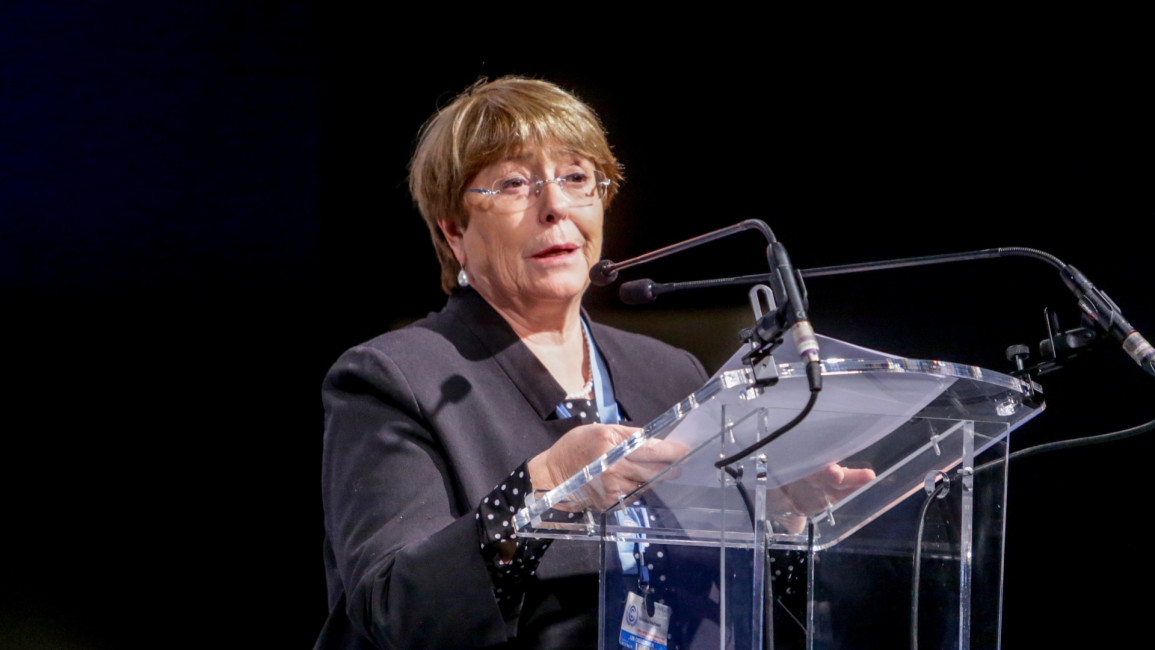UN rights chief to visit China's Xinjiang in May
The UN human rights chief said Tuesday she would make a long-delayed visit to China in May, including to Xinjiang, where Western lawmakers have accused Beijing of genocide.
"I am pleased to announce that we have recently reached an agreement with the government of China for a visit," Michelle Bachelet told the UN Human Rights Council.
She said that the UN rights agency, OHCHR, and Beijing had "initiated concrete preparations for a visit that is foreseen to take place in May."
Nearly 200 rights groups meanwhile demanded Tuesday that Bachelet's office release its long-postponed report on the rights situation in Xinjiang.
"The release of the report without further delay is essential - to send a message to victims and perpetrators alike that no state, no matter how powerful, is above international law or the robust independent scrutiny of your office," the 192 groups, including Human Rights Watch and Amnesty, wrote in an open letter.
There have long been calls for the UN High Commissioner for Human Rights to visit Xinjiang and to publish her office's findings on the situation there.
Rights groups say that at least one million mostly Muslim minorities have been incarcerated in "re-education camps" in Xinjiang, a far-western region where China is accused of widespread human rights abuses including forced sterilisations of women and forced labour.
The US government and lawmakers in five other Western countries have declared China's treatment of the Uyghurs in Xinjiang a "genocide" - a charge denied by Beijing.
China says it is running vocational training centres in the region designed to counter extremism.
The Chinese government has for years said that Bachelet was welcome to visit Xinjiang, but an agreement on her demand for "meaningful and unfettered access" has until now appeared elusive.
On the sidelines of the Winter Olympics, UN Secretary-General Antonio Guterres told leaders in Beijing last month that he expected them to allow Bachelet to make a "credible" visit to China, including to Xinjiang.
And on Tuesday, Bachelet said an agreement had been reached.
"Preparations will have to take into account Covid-19 regulations," she told the rights council.
"The government has also accepted the visit of an advanced OHCHR team to prepare my stay in China, including on-site visits to Xinjiang and other places," she said.
"This team will depart to China next month."
Bachelet's spokeswoman Elizabeth Throssell confirmed to reporters that the high commissioner would visit the region.
"I can confirm that both the advanced team and the High Commissioner will go or are due to go to Xinjiang, and obviously visit Beijing and other locations," she said.
Throssell said negotiations had produced "an agreement on the parameters that respect our methodology," including "unfettered access to a broad range of actors, including civil society."
Diplomats in Geneva hailed the news of Bachelet's visit.
"We welcome any effort to shed light on the systemic violations of human rights in Xinjiang," said British Ambassador Simon Manley. "We look forward to her report into the situation."
The French mission in Geneva also welcomed the announced visit as "a positive development."
It stressed though that the visit "must not obscure the urgency of publishing the report" on the rights situation in Xinjiang.
Neither Bachelet nor Throssell provided an update on when the report would emerge.
Observers in Geneva suggest it has been ready since last August.
An OHCHR spokesman had suggested in December that the report would be published within a few weeks, but it still remains unclear when it will be made public.
In their open letter Tuesday, the rights groups questioned why it was taking so long, pointing out that many of them had already documented abuses in Xinjiang. It said these included "systematic state-organised mass detention, torture, persecution, and other violations of a scale and nature amounting to crimes against humanity."
"We have repeatedly raised alarm, including to your office, over the extreme measures taken by Chinese authorities since 2017," they wrote.
They said they "have been concerned by the relative silence of your office in the face of these grave violations."



